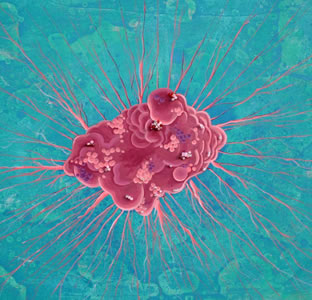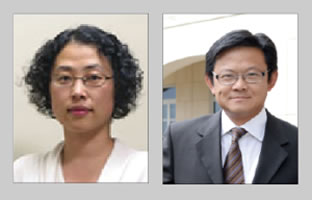UTSA College of Engineering receives $1.08 million NIH grant


Top photo: Cancer cell
Bottom photo: Jianqiu (Michelle) Zhang (left) and Yufei Huang


Top photo: Cancer cell
Bottom photo: Jianqiu (Michelle) Zhang (left) and Yufei Huang
(Dec. 2, 2014) -- The National Institutes of Health recently awarded a $1.08 million grant to Yufei Huang, professor in the UTSA College of Engineering Department of Electrical and Computer Engineering, and Jianqiu (Michelle) Zhang, associate professor in the UTSA Department of Electrical and Computer Engineering, to develop new bioinformatics tools to study mRNA methylation and breast cancer.
"Basically, we are looking at the inner workings of mRNA and methylation and by using deep genome sequencing technology and computer models, we are trying to uncover a new mechanism of cancer," said Huang. "Such mechanisms can help us predict which cells in a human's body may become cancerous and stop cancer in its tracks before it even forms."
The research team also includes Manjeet K. Rao, an RNA biologist, and Yidong Chen, an expert in deep sequencing and bioinformatics, from the University of Texas Health Science Center San Antonio.
"By bringing together computer engineers who are experts in computational modeling with experts in biology and RNA sequencing, we have added a new dimension to the emerging study of mRNA methylation," said Huang.
MRNA methylation refers to the chemical modifications to the mRNA molecules that code genetic information. Abnormal modification could alter the genetic codes that command the orderly functions of human cells and thus lead to diseases such as cancer.
Huang says that the result of this research hopefully will cast new light on the role of mRNA methylation in regulating the dynamics between normal and disease states and thus may provide leads to more effective strategies for future therapeutic intervention.
"The research planned to be performed by doctors Huang and Zhang with the team at the UT Health Science Center through this NIH grant has potential to fundamentally change how we see human diseases," said Daniel Pack, chair of the Department of Electrical and Computer Engineering. "By bringing experts from both medical and engineering fields together to study cancer using powerful computational engineering tools, the team has a great chance to contribute in finding solutions to one of the society's most difficult problems. Doctors Huang and Zhang are the right individuals with the right knowledge and skills to be on this team."
To address the need for high computational power need to run the study's simulations, the team also will work with UTSA Cloud and BigData Laboratory researchers to seek computing solutions for these bioinformatics tools. The UTSA Cloud uses a multiple-cell concept where a cell consists of compute, storage and network nodes that are built using the Open Compute hardware, and allow for flexibility in adapting the systems to changing engineering and scientific application requirements.
"We are so excited to be working on such an exciting project that could possibly change the way we look at cancer," said Huang. "I am honored that we were awarded this prestigious NIH grant, and know that we are going to be doing some ground-breaking research in the course of the next few years."
------------------------------
This story is republished courtesy of the UTSA College of Engineering. The story also is posted on the Engineering website.
For more information, contact the UTSA College of Engineering at 210-458-4490.
Connect online with UTSA on Twitter, Facebook, YouTube and Instagram.
Events
Join the PEACE Center and Wellbeing Services for Denim Day, a day of learning about the importance of consent and why we wear denim on the last Wednesday of the month each April during Sexual Assault Awareness Month. Stop by our Denim Day display to take a photo in front of our Denim Wall, spin the "Is It Consent?" Wheel, and get a Concha or goodie.
Student Union Window Lounge, Main CampusLearn to use Zotero®, a citation manager that can help you store and organize citations you find during your research. Zotero can generate bibliographies in various styles, insert in-text citations and allow you to share sources with collaborators.
Virtual EventThis event will acknowledge graduating seniors from the McNair Scholars program at UTSA before inducting the new cohort of scholars into the program.
North Paseo Building (NPB 5.140), Main CampusAt this memorable celebration, UTSA graduates will be introduced one-by-one to cross the stage and accept their doctoral degrees.
Arts Building Recital Hall, Main CampusRoadrunner Walk is an event for graduating students to have a memorable walk on campus to celebrate an important milestone and their achievements. Graduates will walk along the Paseo while being celebrated by the UTSA community, friends, and family members.
Student Union Paseo, Main CampusCelebrate the accomplishments of College of Education and Human Development, College for Health, Community and Policy, College of Sciences and University College.
Alamodome, 100 Montana St.Celebrate the accomplishments of Alvarez College of Business, College of Liberal and Fine Arts and Klesse College of Engineering and Integrated Design.
Alamodome, 100 Montana St.

